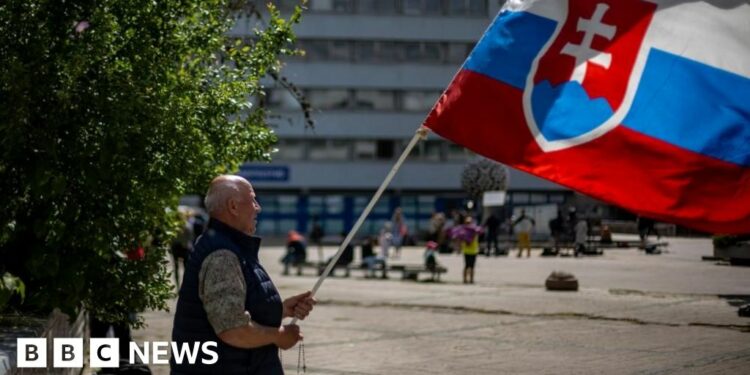At the spot where a man tried to kill a prime minister there is a bullet hole and a small bloodstain.
Faint traces of a giant moment that has shocked Slovakia deeply. But the gunman’s target had seen this coming.
A month earlier, Robert Fico, Slovakia’s populist leader, was filmed predicting political tensions were so acute “a leading government politician” would end up getting murdered.
Then, the prime minister himself was shot. Hit four times in the stomach and arm at close range as he greeted supporters in a small former mining town.
Article informationAuthor, Sarah RainsfordRole, Eastern Europe correspondentReporting from Handlova and Bratislava, Slovakia
18 May 2024
The attempted assassination sprang from a toxic political climate, and threatens to deepen the polarisation in Slovakia still further.
Mr Fico’s warning of an imminent attack was no throwaway comment.
He repeated the thought to the head of Slovakia’s public broadcaster around the same time.
“I told him ‘Prime Minister, things are not that bad’,” RTVS boss Lubos Machaj recalls the conversation after an interview he conducted in April.
“He said he didn’t know, but he had warned his ministers to be careful.”
Image caption, Mr Fico was hit four times in the stomach and underwent a further two-hour operation on Friday
It was around the time of Slovakia’s presidential elections, which were won by an ally of Mr Fico in the second round.
Attempting to Kill a Prime Minister
For over six months, all agree, the political climate has been particularly hostile although the divisions date back to at least 2018, when a journalist investigating high-level corruption claims was murdered.
Mr Fico was forced to step down then, amid giant protests.
His re-election last year was a major comeback achieved on a platform that included promises to end military aid to Kyiv and veto Ukraine’s Nato ambitions, as well as other talk more reminiscent of Moscow than Brussels.
“I can only hope this tragedy will help to change Slovakia for the better” if tensions have now peaked, Mr Machaj told the BBC.
“But the first reactions of politicians are not suggesting that.”
Video caption, How the attack in Slovakia unfolded
There have been urgent appeals for calm and for unity.
They were led by the outgoing President Zuzana Caputova “standing together” as she put it, with the man who will soon replace her in office.
The same day, with the entire cabinet lined up behind him on stage, Interior Minister Matus Sutaj Estok repeated those calls, warning Slovakia was on the verge of civil war.
That’s extreme. But, multiple interviewees here have described a society in which family members no longer speak.
Two political “camps” driven far apart, with no dialogue.
Alongside his colleague on stage, Defence Minister Robert Kalinak said Slovaks needed to “learn to tolerate different opinions”.
But, the two ministers then promptly accused opposition politicians and the media of stirring up hostility. Several times, they instructed journalists to “take a look in the mirror” and examine whether they were responsible for the attack.
Image caption, RTVS boss Lubos Machaj says some Slovakians are blaming the broadcaster for Mr Fico’s shooting
There’s still very little verifiable information about the would-be assassin.
The few videos and traces left online amount to a confusing profile: opposed to the war in Ukraine but apparently posting in support of a far-right, pro-Russian group, and a writer of anti-migrant poetry and prose.
Government ministers call him a “lone wolf”, whilst insisting his views align closely with the main opposition party, radicalised somewhere along the way.
“Hatred breeds hatred,” the interior minister warned.
Such talk sounds hollow to some.
“When we talk about a toxic environment, it’s difficult not to say who is the prime party responsible for that: it’s the Smer party,” argues Pavol Babos, a sociologist at Comenius University in Bratislava.
“I’d have bet on an attack being on a member of the opposition, not the prime minister,” he says.
Image caption, A man waves a Slovak flag outside the hospital where Mr Fico remains in a serious condition – the country is at a pivotal moment
Allies of Mr Fico have publicly called President Caputova an “American whore”.
The prime minister refers to her as a US agent. The president was then sent death threats that echoed such language.
Very soon after the shooting in Handlova, a short video was leaked showing the gunman in custody.
It’s not clear whether the 71-year-old is speaking freely, but he refers to the government’s neutering of RTVS, suggesting that might be one source of anger. One motive for his attack.
Mr Fico had begun a process to abolish the public broadcaster, claiming it was “not objective”.
“The media aren’t there to make politicians look pretty,” RTVS boss Mr Machaj said, rejecting the criticism and describing his team’s role as “reflecting the reality” around.
But some now blame the broadcaster for the shooting.
“We are getting threats every day and they are serious,” Mr Machaj said. He has been advised to get a bodyguard.
“I lived through the censorship of the communist 1970s and attacks on the press in the 1990s, but I consider this the most dangerous era,” he says.
At the scene of the attack, the police tape has gone. Local children cycle across the square. Music booms from an open window and an aerobics class.
A few dozen miles away Mr Fico remains in intensive care, his condition reported as stable though still serious.
And Slovakia is at a pivotal moment.
“Much now depends on Robert Fico and what kind of attitude and approach he will choose, if he comes back,” says sociologist Pavol Babos.
“Whether he’s more aggressive and angry. Or if he decides to calm society down and become a more positive person.
“I’d say it’s 60-40. I’m afraid he will be full of revenge.”
Source link : https://www.bbc.com/news/articles/c89z7ll532xo.amp
Author :
Publish date : 2024-05-17 07:00:00
Copyright for syndicated content belongs to the linked Source.


